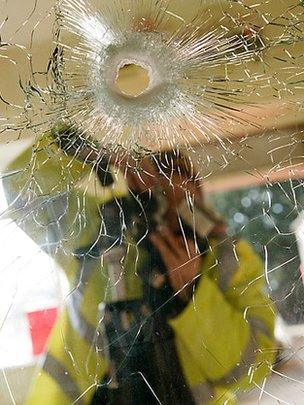Forensics upheaval 'threat to justice', MPs warn
- Published

The committee's report says that forensic science needs a coherent strategy
Major crimes could go unsolved unless the government does more to support forensic science, MPs have warned.
The Science and Technology Committee has published the results of a follow-up inquiry into the closure of the Forensic Science Service (FSS).
Private firms and in-house police labs now fill the gap left by the FSS.
The report paints a picture of a chaotic new landscape for forensic provision and says private firms need help to survive in an unstable market.
It says that unless the government formulates a coherent strategy for forensic science in England and Wales, the criminal justice system could be jeopardised.

Private providers and in-house police forensic teams have filled the hole left by the FSS
Labour MP Andrew Miller, who chaired the committee's inquiry, said: "Forensic science provides vital evidence to the criminal justice system and if the government wants to continue being able to put the most serious criminals behind bars it has a duty to protect its health.
The government announced its decision to close the FSS in December 2010, with the intention that the private sector would expand to fill the gap.
Estimates vary for the size of the forensics market, ranging from about £90m to £65m per annum. But few doubt the market is shrinking, placing private providers under pressure.
Private firms complain that the practice by police forces of bringing forensic work in-house [insourcing] is a major contributor to this decline. That is strongly denied by the government, along with senior police officers.
The committee concluded that it was impossible to know what part insourcing played in this without access to details of police expenditure - which it tried to obtain without success. As a result, it recommends that a working group is established to review the accounting practices of police forces.
'Strategy lacking'
The minister for crime prevention, Jeremy Browne MP, gave evidence to the inquiry in parliament and received extraordinary criticism in the report.
The committee claims he "had not prepared for the evidence session", adding that it was "disappointed at his disregard of his responsibility towards a parliamentary select committee".
Mr Miller added: "Unfortunately, the current minister doesn't think [forensic science] needs a strategy, instead preferring a hands-off approach.
"This is the type of thinking that led to the creation of an unstable forensics market, which led to the demise of the Forensic Science Service and now threatens the success of remaining private forensic science providers."
The committee recommends the forensics brief be moved to the office of the minister for policing and criminal justice because the criminal justice system was the "ultimate customer".
On the question of standards, the report said that some police labs had made little progress towards meeting the same quality benchmark as private providers.
It said the forensic science regulator, Andrew Rennison, had a key role in ensuring labs complied with quality standards. MPs reiterated a previous call for the regulator's position to be strengthened with statutory powers.
Chief Constable Chris Sims, national policing lead for forensic science with the Association of Chief Police Officers (Acpo), said: "Acpo is working with the Home Office to develop a strategic response to the changing forensic marketplace.
"Police forces have made considerable advances, working with the Forensic Science Regulator, to meet the quality of international standards."
Crime reduction
There was also concern in the report over a lack of funding for research into new techniques. Mr Miller commented that research was "the lifeblood of forensic science and yet we heard that serious crimes, like rape and murder may be going unsolved as we rely on outdated technology".
Responding to the report, a Home Office spokesperson said: "Our police reforms are working and we will ensure forces have access to the best possible forensics services to help ensure our record low levels of crime continue to fall.
"Forensic provision is best served by a competitive market with companies competing to provide the best service.
Sue Ferns, from the professionals union Prospect, said: "Today's report vindicates Prospect's warnings when the FSS was closed. We have seen the haemorrhage of highly qualified scientists with years of training and experience.
She added: "We also back the observation that leaving police forces to conduct their own forensic science is a threat to impartiality."
Senior police officers reject this suggestion and point out that advances in technology make it inevitable that forensic techniques migrate from laboratories to the frontline, citing fingerprinting as an example.
Paul.Rincon-INTERNET@bbc.co.uk and follow me on Twitter, external
- Published8 February 2013
- Published30 January 2013
- Published31 August 2012
- Published18 July 2012
- Published4 July 2011